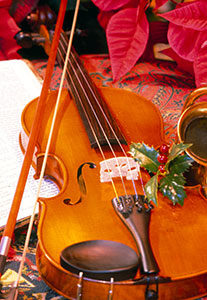-
Music Notes: Lessons and Carols
- Posted on November 27, 2016
- by Nancy
- in Latest News, Spire link, Worship
- Comments Off on Music Notes: Lessons and Carols
 Magnificat [c. 1740] by Francesco Durante (1684-1755)
Magnificat [c. 1740] by Francesco Durante (1684-1755)Sunday, December 18, 2016, 10:00 AM
On Sunday, December 18, the Senior Choir will present the church’s annual Festival of Lessons and Carols, a beloved tradition from England wherein God’s word is proclaimed and contemplated in a special sequence of readings, prayers, choral anthems and congregational carols and hymns.
The Festival of Nine Lessons and Carols is most affectionately connected to King’s College in Cambridge, England, where it has graced the Chapel on Christmas Eve since 1918. The service was first broadcast in 1928 and, with the exception of 1930, has been broadcast annually, even during the Second World War, when the ancient glass (and also all heat) had been removed from the Chapel. Sometime in the early 1930’s the BBC began broadcasting the service on the World Service. It is estimated that today there are millions of listeners worldwide. It has since been adapted and used by churches and schools all over the world.
In the Festival of Nine Lessons and Carols, we weave together scripture, poetry and song, calling on readers and musicians from all ages and stages. We trace a spiritual progression that carries us from prophecy to fulfillment, from Old Testament foretelling to New Testament celebration of the birth of Christ.
As a part of this year’s Lessons and Carols, the Senior Choir will present Francesco Durante’s Magnificat, scored for chorus, soloists and orchestra. The Magnificat depicts a familiar story—that of maiden and angel—based on words attributed to Mary on learning both of her pregnancy and its significance to humanity. Myriads of composers have set this monumental text, with strength, grace and discipline, including Guillaume Dufay, Josquin des Prez, Charpentier, Pachelbel, Vivaldi, J.S. Bach, Schubert, Mendelssohn, Gounod, Bruckner, Vaughan Williams, Rachmaninov, Arvo Pärt—to name only a few compositional superstars.
Mary’s elegantly exuberant prayer, sometimes called the “Song of Mary” or the “Canticle of Mary,” is a spontaneous outburst in song—a response to God’s call. Mary sings of her own experience, her own hope, and out of the experience and hope of her people as well. The Magnificat is a lovely expression of acceptance, of joy at God’s promises kept, a celebration of the tables being turned, or overturned: the lowly are lifted up, the proud are brought down, and the hungry are fed. God remembers the people of Israel, and the promises God has made to them.
Francesco Durante (1684-1755) composed two versions of this Magnificat in B Flat—the four-part version that we perform today—and a more elaborate five-part version. The composition date of either version is unknown, but it is thought that both were written in the 1740s. Mystery and controversy have shrouded this Magnificat. Although scholars traditionally agree that Durante composed the work, in 1910 musicologist Giuseppe Radicciolli attributed the work to Giovanni Battista Pergolesi, Durante’s talented pupil. That myth has haunted the work ever since. Today, the piece is firmly attributed to Durante, and his rendering of the Magnificat text is both a hymn of joy and thanksgiving. Durante, unlike his peers, distinguished himself as a composer of liturgical music. He was a Neapolitan, and it was the fashion among composers of the day to grandly produce operatic repertoire. This was not so for Durante, and this Magnificat represents his most significant piece.
The work consists of six movements with counterpoint in the first movement built upon the eighth psalm tone cantus firmus—the original Gregorian chant melody (“Magnificat anima mea Dominum” or “My soul doth magnify the Lord”). In each successive movement, overlapping, imitative melodic lines are carefully woven, using text, tempo and vocal color to lend each movement distinct and particular character. The recapitulation of the opening chorus at the end of a work was a growing practice for Neapolitan composers in the latter half of the eighteenth century. In the sixth movement we see this with an almost literal repetition of the opening material, this time using the “Sicut erat” (part of the Doxology: “As it was in the beginning”) to complete the Magnificat.
The joy of the season is calling. Please remember to join us for this festive and moving celebration in word and song, Sunday, December 18, 2016, at 10:00 AM.!
In faith,
—Jane Ring Frank, Minister of Music and Worship Arts






